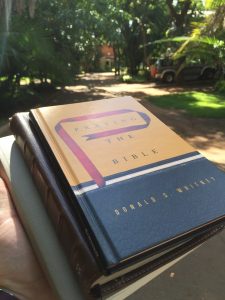
by Michael Davis | Aug 27, 2018
EDITOR’S NOTE: While regular Millennial Monday blogger Emily Howsden is away on maternity leave, Millennial Monday will continue as guest bloggers fill in over the next couple of weeks.
The air was clean and crisp. The sounds were devoid of cars and people. The sky was littered with stars, and I had no cell service.
The Great Smoky Mountains gave me the opportunity (however forced) to disconnect and look upward. Not “look upward” in the metaphysical sense, but quite literally. It was so dark that I could scarcely see anything around me except the stars above, which were in staggering abundance.
If you’re anything like me, when someone asks “How are you?” your immediate response – before you can think of an actual response – is “tired,” even if you aren’t tired!
Either 1) the actuality of my state of exhaustion is so evident in me that it precedes any other state, or 2) I desire others to recognize that I am working so hard that I can only be “tired.” Either way, I find myself describing my state of being as a result of my lack of rest and focus.
Additionally, if you’re anything like me, moments granted where rest may be achieved are overcome by mobile notifications that need to be checked and stories that need to be watched. Though my rest in the Smokies was “forced” by way of stripping all distractions from me, it was so incredibly welcomed as soon as I stopped thinking about ways to circumvent it.
Without even noticing, how often do we deprive ourselves of rest? You may say, “I rest on the weekends while watching sports” or “I find it restful to nap and not leave my house,” but maybe defining rest is helpful to understanding rest.
Think about rest in two areas: general rest, and Sabbath. I know, sabbath sounds strangely formal, but I appreciate that Adam Mabry in “The Art of Rest” defines it simply as “a time of rest, holy to the Lord.” From that definition, all the things in my do-this-for-rest” category fail to meet the qualification of Sabbath, and I’m not using “sabbath” as a synonym for “Sunday.”
Looking at my drive to the top of Balsam Mountain, I was in the middle of general rest – a vacation. However, I only experienced a time of sabbath when the night came to an end, dinner was finished and it was time to sleep. Honestly, while initially put-off by “no service” on my phone, I was overtaken by the beauty around me. In that moment, I stopped and focused on the Lord outside of a “quiet time” for the first time in a while, and just splendored at the magnificence of His creation around me.
In fact, the words of Psalm 8:3-4 resounded in my head: “When I consider Your heavens, the work of Your fingers, The moon and the stars, which You have ordained; What is man that You take thought of him, And the son of man that You care for him?” (Emphasis mine)
I was overwhelmed that as my eyes continued to adjust to the darkness, I saw more and more stars…each given a name and remembered by the Lord. I was overwhelmed, understanding that the same God, who created those stars in their multitude, cares deeply for me. My time of general rest turned sabbath, and my state of exhaustion turned to reverence.
Realizing powerful sabbath rest made me convicted, not that I look for ways to avoid such rest, but that I often fail to seek such rest. Mabry hits the nail on the head when he wrote: “We’re quite happy to sing and study about the God who rules. We just don’t believe what we say enough to regularly lay down our rule. We creatures, made to co-create with God, have so idolized our creative works that we refuse to honor God as the Creator. Yet that’s exactly what Sabbath rest is about.”
It’s powerful to know AND internalize the compelling truth that the God of the universe who made those beautiful stars littering the sky, and the nightly symphony of sound heard even in the most remote of location, also made you. He made you (Psalm 139:13) and understands you more that you understand you. He knows when you need a sabbath (probably right now) and he knows how you must sabbath.
What’s more, He isn’t surprised that you’re tired! Genesis 3 gives a hint that man will spend his life working, and even Hebrews 4 reminds us that Jesus is not surprised by any moment in our lives because He was tested as we are, but remained without sin. Our Father desires through our lives as Christians for us to rest, and for that rest to be rooted and built-up in Him (Col. 2:6-7).
I’m rested and eager for rest; I’ve sabbathed and am eager for sabbath. Just as we look forward to a weekend, let us look forward to a time set apart as holy for the Lord, and may He find us faithful.
Three questions:
1. What are two physical things that keep you from sabbath rest?
- Take a moment to ask the Lord 1) for forgiveness, and 2) for release from “things.”
2. When you try to sabbath, what are frequent thoughts that overtake the moment?
- Take a moment to ask the Lord 1) for guidance in those issues, and 2) for focus.
3. When you try to carve sabbath rest into your schedule, what are its main oppositions?
- Take a moment to ask the Lord 1) for wisdom, and 2) for courage to make sabbath a priority.

by Michael Davis | Jul 30, 2018
EDITOR’S NOTE: While regular Millennial Monday blogger Emily Howsden is away on maternity leave, Millennial Monday will continue as guest bloggers fill in over the next couple of months.
Let me start by saying that God’s love is not reckless. ‘Reckless’ infers chaos and lack of control, both ideas contrary to His nature. Our Father (and His love) is good and kind; our Father fights for us and paid a great sacrifice. Our Father’s love is overwhelming and certainly never-ending; we are unable to earn His love, and we don’t deserve His love. However, our Father’s love is not reckless.
So why do I still love this song? His love for me makes no sense.
Its writer, Cory Asbury, looked toward the parable of the lost sheep as his inspiration for this song. What good shepherd leaves caring for 99 sheep to find one that has wandered away? To pursue one who disregards you seems nonsensical, but to our Father, who made us, is perfectly logical and necessary. In fact, Jesus suggests that any shepherd would leave the larger flock in order to find a lost sheep.
“What do you think? If a man has a hundred sheep, and one of them has gone astray, does he not leave the ninety-nine on the mountain and go in search of the one that went astray?” Matt. 18:12 ESV (Emphasis mine).
In my finitude, I can understand the action of the shepherd as reckless, but only because I know how much of a worthless sheep I am. To leave 99 sheep of great value to seek me, a sheep unclean and unrighteous makes no sense. To contrast, however, Jesus gives an example of a truly reckless response in that of a hired hand in John 10:12 who flees when a wolf puts the sheep in danger.
I must admit that the first time I heard this song, the word choice for describing God’s love failed to strike me as odd at all, and when I sing this song, I understand how I mean the word “reckless,” and I sing with a thankful heart that He would do something that appears so reckless in seeking me!
But as a worship leader, I cannot determine how you mean the word “reckless.” Entrusted to me (and those of you who lead worship also) is the very real responsibility of leading both sheep among the fold and those still being sought, to a place of encountering God, and my time leading, must be intentional and focused.
If you’re anything like me, you can hear a line of a song once and it is entrapped in your mind and you find yourself humming it, or even singing it under your breath. Lately, while reading R. Kent Hughes’ Disciplines of A Godly Man, I’ve been thinking about the role that meditation in Psalm 1:2 plays in my daily life. Hughes explains the word “meditate” to mean mumble or mutter, and I have challenged myself to (I know this sounds crazy) mumble or mutter scripture I am memorizing through my day. How great would it be to leave those around you humming (or singing under their breath) songs rich in scripture and theology, further helping them hide the Word in their hearts?
A challenge to worship leaders from a (very green) worship leader: lead your congregations with two things in mind, 1) lead with the new Christians in mind and 2) lead so that the lost are confronted with truth. I want the words of my mouth and the meditations of my heart AND the songs I sing to be pleasing to my Rock and Redeemer, and I want new Christians to learn new ways to rightly focus and express their affection toward God.
Additionally, I want the songs I sing to present the Gospel with as little confusion as possible for those who are lost. To sing of God’s love as reckless for me may mean something totally different than for the lost person who truly understands the meaning of reckless in their life without Christ.
So yes, I sing “Reckless Love” with a thankful heart, and with (what I believe to be) the intention of its writer, but only in my car, and only by myself.

by Michael Davis | Aug 8, 2017
WORDSLINGERS EDITOR’S NOTE: Michael Davis has the unique pleasure to serve year round at Falls Creek Baptist Conference Centers, near Davis, Okla., as Falls Creek’s multimedia coordinator. During the summer, Falls Creek hosts what has been acclaimed by many as the “world’s largest Christian youth encampment,” as more than 5,000 students come each week over an eight-week period to attend youth camp. This summer, Falls Creek celebrates its 100th anniversary of hosting summer camp in the Arbuckle Mountains in southern Oklahoma.
Each year at Falls Creek, there are several songs that stand out as anthems of the summer. Songs from years past, such as Blessed Be Your Name, Our God, Everlasting God and The Stand served to further contemporary worship in connecting modern audiences with the act of corporately worshiping our God.
This year, The Lion And The Lamb (CCLI# 7038281) worked its way to the top of Falls Creek’s most-played song list at twenty-one plays. In fact, The Lion And The Lamb was the only song to be played every single week this summer! I asked Cody Dunbar, worship pastor at Bethany, Council Road – who has led worship many weeks of Falls Creek – what it is that makes this song so popular today. His response:
“The Lion And The Lamb is one of my favorite new worship songs. It is rare today to find a solid upbeat song that has an easy melody and rich theology portrayed in lyric, while also filling the appetite of a modern musician. This song does all of those things. It’s a great song to put in the front of a worship set as a call to worship. You can lead it in a camp setting or on a Sunday morning, and it seems to translate and engage in both settings.”
I want to focus on three aspects that make this song not only a popular choice, but a good choice.
Easy: A Song All Can Sing
Dunbar mentioned above that The Lion And The Lamb has an easy melody, and he went on to say that it is an “easy song to modulate into different keys so the worship leader can be in his or her ‘wheelhouse’ vocally while not getting outside of what the congregation can handle in terms of pitch.”
As soon as those first notes are played, there is a consistent energy, from week to week, that overwhelms the Tabernacle. Students rise, and with excitement join together in proclaiming this rich anthem. With hands lifted high and smiles on faces, the sight of thousands of students proclaiming truth together is so extremely powerful, encouraging and important.
True: Theologically Rich
In addition to an easy melody, Dunbar mentioned that this song has a “rich theology portrayed in lyric.” The majority of songs our churches sing today are certainly theologically sound, but not always are they theologically rich. When I think of theologically-rich songs, I think of hymns and how they have shaped my theology today. Sadly, there are many songs that are taught and led in churches today that are catchy and fun, but incredibly shallow.
As I began dissecting lines and ideas from The Lion And The Lamb, I immediately noticed the theological richness of its composition. From the first line, “He’s coming on the clouds” (Mark 13:26, Rev. 1:7), to the truth found in the chorus that our God fights for us (Hos. 11:10, Rev. 5:5), each phrase and declaration echoes Biblical truth.
Hopeful: Our Savior Is Coming Back
The theological richness of The Lion And The Lamb allows the worshiper to declare truths of Christ’s return and His power over the enemy. As sinful creatures placing our hope in a Savior who not only promises that He will save those who call upon Him, but also One who fulfills His promises, the words of this song remind our deceitful hearts of the hope to come!
The Son of Man will return on clouds (Mark 13:26), king and kingdoms will bow down before Him (Phil. 2:9-11), our bondage will break (Rom. 6:6), and we declare His praise (Rev. 5:13), and no one can stop Him (Job 42:2)!
Our God is the Lion of the tribe of Judah (Rev. 5:5) who roars with power (Hos. 11:10) and fights for us (Ex. 14:14)! Every knee will bow before Him (Phil. 2:10). Our God is the worthy Lamb who was slain to take away the sins of the world (John 1:29, Rev. 5:12), and His blood breaks the chains cause by that sin (Psalm 107:14, Rom. 6:6)!
Open up the gates and prepare a way for the King of kings (Psalm 24:9, Isa. 40:3) because our God who comes to save (Luke 19:10) is here to set free those who are held captive by sin (Luke 4:18), and no one can stop Him (Job 42:2)!
Let us be ever thankful for songs that continue to edify the body of Christ through outward praise and inward hope.

by Michael Davis | Jun 21, 2016
I’ve sat through hundreds of Falls Creek services throughout my time, working as a summer staffer and BGCO employee, but tonight I’m watching my first service solely via the livestream. Since my job while at Falls Creek primarily put me behind a monitor during the services, watching on a TV in my home feels natural and hearing the student respond with applause, laughter and singing makes me feel like I am in the room.
While thousands of students and sponsors are at camp each week, countless parents, grandparents, aunts, uncles, Sunday school teachers, and friends pray for God to speak to those campers and for the past century, He has. But in addition to those campers filling that beautiful tabernacle, I think of those summer staffers sitting in the back few rows just to the right of the sound booth.
It’s currently week two and most of the staff are starting to really be confident in their jobs. They are speaking in cabins at night; they are encouraging students who make decisions, and they are getting to know each other both as co-workers and roommates. While a summer working at camp is incredibly rewarding, it’s also crazy exhausting. As you pray for your campers this summer, I want to give you three ways to pray for our summer staffers at both Falls Creek and CrossTimbers.
Sunday nights at camp are for staff worship and are such a coveted time of praise and thanks for the work God did in the previous week and hopeful expectation for His work in the week to come. Pray that as the staff worship on Sunday nights they are spiritually refreshed, and that their time in small groups after worship would be uplifting, vulnerable, and encouraging.
From archery to ropes course, lifeguards to program staff, media to accounting, there are so many areas in which our staffers minister to campers each week. Pray that as these faithful college students minister to our guests, that they also stay unified as one staff and that Satan’s attempts to break them up yield no fruit.
Just like campers who often leave a difficult situation at home when they come to camp, there are members of our summer staff who are surely stressed about school, concerned about their home life, are burdened for their lost family members and are struggling with how difficult it is to work at camp. Pray that each morning as our staff wake up still tired from the day before that the Holy Spirit would comfort them in their stress, worry, and struggles, and give them energy to affect positively students who undoubtedly need positivity from someone who genuinely cares about them.
Make time this summer to watch the Falls Creek livestream and as you occasionally hear the audience, think about the summer staffers who have given up their break to work a job that is exhausting, thankless, and hard, but incredibly rewarding, and thank God that He faithfully calls students each year to serve at Falls Creek and CrossTimbers.
You can watch the Falls Creek evening services at skopos.org/live Monday-Friday at 7:00pm CST.

by Michael Davis | May 23, 2016
I’m sure you, like me, have experienced those convicting moments where while praying you either say the same thing several times, or your mind wanders and you must reign in your thoughts. There are a multitude of means by which Satan affects our prayer lives, but we must be prepared to combat him.
For me, my prayers often seemed stale and shallow. I rarely remembered the issues or people about which or whom I had interceded, and that was convicting. This past fall I purchased Praying the Bible by Don Whitney, professor of Biblical Spirituality at Southern Seminary at a conference and shelved it when I returned home. As I was packing several weeks later for a month-long international trip, I stuffed the book in my carry-on and kept packing.
The elusive “quiet time” has been a downfall for many, and the material we use with the intention of guiding us through studying Scripture often ends up supplementing or replacing our Bibles and can be incredibly dangerous, even heretical (I’m looking at you, Jesus Calling).
As I began to read Praying the Bible, I immediately understood that this was not a study guide that would help my quiet time but a method of approaching prayer and Scripture reading that would transform my prayer life.
I finished the book in one week (it is short!) and began the journey of praying the Bible beginning with Galatians (Whitney presents a model for Psalms). In addition to the method Whitney teaches, my pastor had also recently suggested journaling prayers, a great way to see in timeline view God’s faithful answers to our petitions.
Armed with my Bible, journal and a pen, I started this journey of a renewed prayer life and have been forever changed.
I urge you not to let your prayer life go stale like I did, and if (when?) you do, return to the Scriptures (Heb. 4:12), pray for forgiveness (1 John 1:9), daily approach the throne of God (Rom. 12:12), and trust him to be near you (Psalm 145:18).
Praying the Bible is a short, inexpensive book that has completely changed my prayer life, and I cannot recommend it enough.




